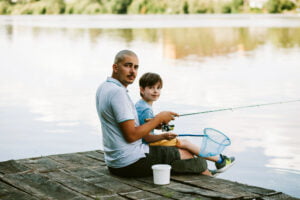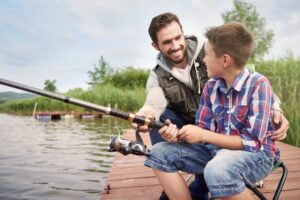
Introducing your children to fishing for the first time is an exciting but potentially dangerous endeavor. You are already aware of the difficulties that lie ahead, and the thought of the younger ones hunting on the waters makes you feel a little uneasy. Spending time in nature and bonding with your offspring all while enjoying a fun activity is the perfect recipe for a successful fishing trip. However, the level of preparation plays a significant role in determining the outcome. If you do not make adequate preparations for success, there is a good chance that your children will be put in dangerous situations on the water or will develop an aversion to the activity entirely.
We have compiled a list of helpful hints to direct you and make it simple for you to pass on your passion to younger generations so that you can have a memorable experience on your first fishing trip with your children.
1. Locate an area that is ideal for fishing
Try to find a place where children are welcome to fish and where there is plenty of fish. You have the option of beginning with a pond, river, lake, or reservoir; however, it is recommended that you begin on a small scale. Find a location with fish that are easy for children to catch on their own, such as bluegill or crappie, and go there. The kids will have a once-in-a-lifetime experience and excitement as a result of this, which will encourage them to go fishing again. When going boat fishing with children, you should give some thought to fishing in calm, shallow bays. This will help keep everyone safe.
When kids do not succeed in catching a fish for an extended period of time, their interest can quickly wane. Therefore, you should not be afraid to try fishing in a variety of locations; for example, you could move to the opposite side of the pier or try fishing in a different part of the lake. You could also invest in a fish finder that is castable and can be thrown out onto the water. Even if you are fishing from the shore, this will tell you whether or not there are any fish in the location you have chosen to fish.
2. Begin with the most basic of equipment
Children learn best when they are actively involved in the process. Consequently, you should acquire equipment that is sized appropriately for children and that they will be able to handle effectively. It should be small enough for them to handle without strain. Think about using a rod that’s 5 feet long, some split shots, a bobber, and 8-10 pound fishing line. The use of a bobber is recommended for children because it makes it simple for them to determine when they have received a bite.
Give them a straightforward tackle box to store their fishing necessities in, and make sure they have backups of everything, as children are prone to breaking things. They might get their fishing lines tangled up or lose their hooks and baits, both of which might cause you to have to cut your fishing trip short if you do not have any spares. Most children are more interested in fishing with live bait because it creates more excitement.
3. Bring along sufficient amounts of food, snacks, and water

Children are unable to concentrate when they are hungry. Therefore, make sure you bring enough food to keep them going, such as their go-to snacks, as this will help them maintain their concentration. Always take a snack break after you’ve finished fishing every 30 to 60 minutes to keep the younger children interested for a longer period of time. Another essential thing for you to remember to do while you’re outside is to drink plenty of water to stay hydrated. To prevent your children from becoming dehydrated, make sure you bring along enough water and encourage them to drink it. In addition to water, you could also bring a juice box with you.
4. Keep it to a minimum
When engaged in the same activity for an extended period of time, children are prone to experience feelings of boredom. Set aside a few hours for your fishing trip so that you can be sure your kids will pay attention the whole time and will want to do it again soon. Keep their interest level high until the very end of the trip by informing them of the specific time that they will be expected back. Aim to fish for a maximum of two hours, and gradually increase the amount of time as your children become more interested in the activity and more at ease with it. To avoid being exposed to the searing heat of the sun, plan your excursion for the early morning or the hours before sunset. Additionally, this is the best time of day to go fishing.
5. Make having fun your top priority
It’s possible that adults take fishing very seriously, but kids definitely need some leeway. Honor even the most insignificant achievements, and concentrate your efforts on providing them with an unforgettable adventure. Never lose your composure and always keep a positive attitude, regardless of the outcome. Encourage your young children to participate in a variety of other activities when you observe that they are beginning to show signs of boredom. Some suggestions for activities include having them investigate the shorelines, skip rope, or search for crickets.
6. Give them instruction on proper fishing techniques
If you take the time to teach your children how to fish properly on the very first occasion, they are less likely to forget what they have learned. Make sure they understand that responsible anglers will always play by the rules and will always keep the environment in mind. Hire a fishing guide so that they can learn about the different kinds of fish that can be caught near your chosen fishing spot. Get yourself up to speed on the most recent fishing regulations, and make sure you have the appropriate fishing license for the job. Show them how to protect themselves from potential hazards while they are on the water.
7. Plan alternatives if you don’t catch anything
Even if you fish in the most productive location and employ the most effective fishing techniques, there are still going to be days when you don’t bring home a catch. When there is no other option available, this may cause the children to become agitated and frustrated. You can bring a net with you so that the children can search for a minnow in areas that are not very deep. Allow any children who want to play along the shoreline to do so, whether they want to throw rocks around, play with worms, or engage in other activities. To that end, bring along items for play like a jump rope and the like.
8. Be cautious
While your primary focus should be on assisting your children in catching fish and having fun, you should also make sure they are safe. Dress them appropriately for the weather, bring hats and sunscreen to protect themselves from the sun’s rays, and bring bug spray with you. Even if they are just going to be playing on the beach, you should make sure your children are wearing protective clothing such as reflective jackets. It is a good idea to bring along a change of clothes just in case the ones you are wearing get soaked. Bring along some first aid supplies for the kids so they can treat any minor injuries. However, you might want to think about purchasing hooks without barbs to reduce the risk of injury.
9. Put a positive spin on the trip’s ending
Finish the fishing trip on a positive note for the sake of your children and their future fishing ambitions. You can reward yourself with a little indulgence by doing something fun like stopping at an ice cream drive-through or going to the park. Regardless of whether or not they were successful in catching a fish, the children will feel rewarded at the end of the day. Take the excitement you had fishing back to your house with you by playing fishing-themed games and reading fishing-related books. Visiting an aquarium, becoming skilled at the game “Go Fish,” or learning how to tie knots are just a few examples of possible activities.
10. Carry on
If you leave the kids on a positive note, they will always be looking forward to future vacations with you. Keep going on fishing trips, but mix things up by using a new kind of bait or fishing in a different location each time. This will keep things interesting. Teach new skills to your children as they mature and acquire additional life experience so that you can better prepare them to function successfully as independent adults.
1. Key Takeaways
When you take your children fishing, remember the most important thing is to have fun. Fishing is one activity that pretty much everyone can enjoy, so make sure to include your children in the planning process, and let them do as much of the arranging as they wish. They can pick out the major lure choices and make suggestions on where you should go fishing.

